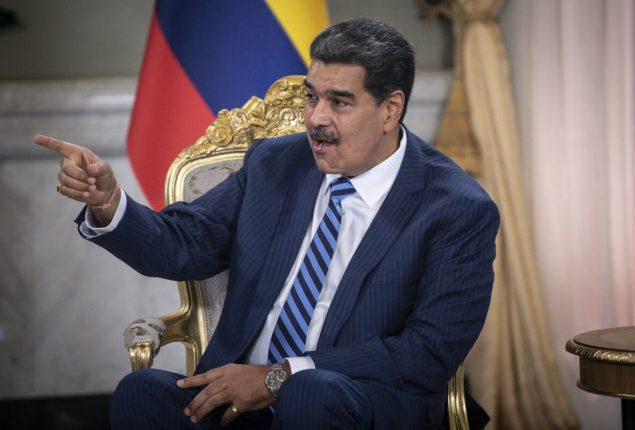Greta Thunberg charged with public order accuse after arrest at London rally
Greta Thunberg charged with public order accused after arrest at London rally....

Venezuelan oil sanctions lifted by US after an electoral deal
The Biden administration has taken significant steps in easing sanctions on Venezuela’s oil sector, marking a substantial departure from the stringent restrictions imposed during the Trump era.
This action comes in response to a 2024 election agreement reached between the Venezuelan government and opposition parties.
The U.S. Treasury Department issued a new general license allowing Venezuela, an OPEC member, to produce and export oil to its chosen markets for the next six months without limitations.
This move is a notable shift from the strict sanctions that had been imposed on Venezuela since 2019. U.S. Secretary of State Antony Blinken emphasized that Washington expects further steps to be taken by the end of November while welcoming President Nicolas Maduro’s electoral concessions.
These steps include lifting bans on opposition presidential candidates and the release of political prisoners and “wrongfully detained” Americans. The possibility of reversing the sanctions relief measures looms if these actions are not taken by Maduro.
These developments follow months of negotiations where the U.S. urged Caracas to take tangible steps toward democratic elections in exchange for a partial lifting of the Trump-era sanctions.
It represents a shift in the approach of President Joe Biden’s administration, which is engaging more with Maduro’s government on various issues, including energy and migration, contrasting with the “maximum pressure” campaign adopted by the Trump administration against the socialist government.
Jorge Rodriguez, a ruling party official leading the government’s negotiating team, welcomed the sanctions relief, stating that it applies to all oil activities and opens up the possibility for individuals and companies to invest in Venezuela.
The agreement reached between Maduro’s government and the opposition in Barbados focuses on electoral guarantees for a monitored vote in the second half of 2024.
However, it falls short of reinstating opposition candidates who had been barred from public office. The U.S. government’s actions are in line with its commitment to provide sanctions relief in response to concrete steps toward competitive elections and respect for human rights and freedoms.
Other restrictions remain in place while the announced measures alleviate some of the toughest sanctions imposed on Venezuela.
Nonetheless, these actions may lead to the reentry of numerous oil companies that had reduced or frozen their operations in Venezuela.
The sanctions on Venezuela were initiated following the disputed 2018 re-election of President Maduro, which was rejected by the U.S. and several Western governments.
These sanctions have prevented Venezuela’s state-run oil company PDVSA from exporting to its chosen markets since 2019.
The changes introduced include a six-month general license permitting the production, sale, and export of Venezuelan crude oil and gas without limitations on customers or destinations. Another general license allows dealings with Minerven, the Venezuelan state-owned gold mining company.
The Treasury Department has stated that it is ready to revoke these authorizations if Maduro’s representatives fail to fulfill their commitments.
The U.S. Treasury has also removed the secondary trading ban on certain Venezuelan sovereign bonds and state-run oil company PDVSA debt and equity. However, trading in the primary Venezuelan bond market remains restricted.
The likelihood of Venezuela’s exports offsetting these cuts remains slim without substantial investment in the nation’s ailing oil sector while the U.S. aims to enhance global oil flows to mitigate high prices due to sanctions on Russia and OPEC+ output reductions.
Venezuela’s oil industry has been grappling with two decades of mismanagement, insufficient investment, and U.S. sanctions since 2019. These challenges are expected to hinder state-run PDVSA’s capacity to quickly return to global oil markets and offer its crude at competitive prices.
Talks between the government and the opposition, intended to address Venezuela’s prolonged political and economic crisis, resumed for the first time in nearly a year.
The deal announced allows each side to choose its 2024 candidate while they agreed to further meetings but doesn’t reverse bans on certain opposition figures. The opposition remains committed to seeking the lifting of these bans.
To stay informed about current events, please like our Facebook page https://www.facebook.com/BOLUrduNews/.
Follow us on Twitter https://twitter.com/bolnewsurdu01 and stay updated with the latest news.
Subscribe to our YouTube channel https://bit.ly/3Tv8a3P to watch news from Pakistan and around the world.
Catch all the International News, Breaking News Event and Latest News Updates on The BOL News
Download The BOL News App to get the Daily News Update & Follow us on Google News.